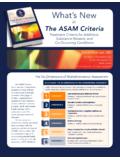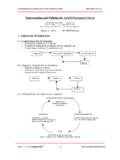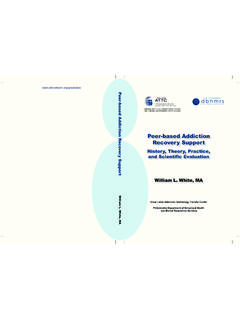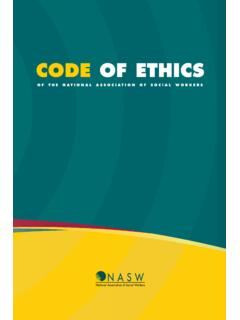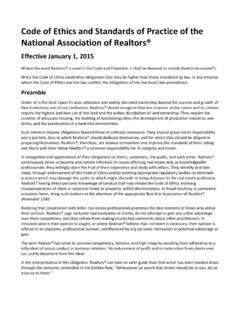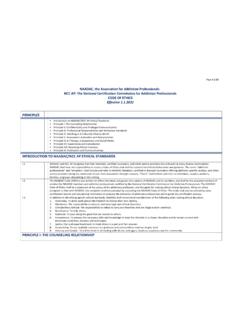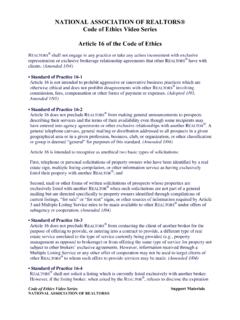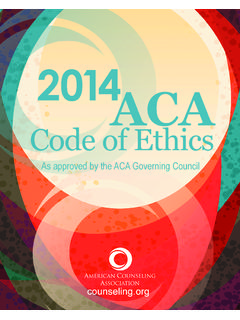Transcription of NAADAC: The Association for Addiction Professionals NCC …
1 Page 1 of 19 NAADAC: The Association for Addiction Professionals NCC AP: The national Certification Commission for Addiction Professionals CODE OF ethics : Approved PRINCIPLES CONTENTS Introduction to NAADAC/NCC AP Ethical Standards Principle I: The Counseling Relationship Principle II: Confidentiality and Privileged Communication Principle III: professional Responsibilities and Workplace Standards Principle IV: Working in A Culturally-Diverse World Principle V: Assessment, Evaluation and Interpretation Principle VI: E-Therapy, E-Supervision and Social Media Principle VII: Supervision and Consultation Principle VIII: Resolving Ethical Concerns Principle IX: Publication and Communications INTRODUCTION TO NAADAC/NCC AP ETHICAL STANDARDS i-1 NAADAC recognizes that its members, certified counselors, and other Service Providers live and work in many diverse communities. NAADAC has the responsibility to create a Code of ethics that are relevant for ethical deliberation.
2 The terms Addiction Professionals and Providers shall include and refer to NAADAC Members, certified or licensed counselors offering Addiction -specific services, and other Service Provider along the continuum of care from prevention through recovery. Client shall include and refer to individuals, couples, partners, families, or groups depending on the setting. i-2 The NAADAC Code of ethics was written to govern the conduct of its members and it is the accepted Standard of Conduct for Addiction Professionals certified by the national Certification Commission. The Code of ethics reflects the ideals of NAADAC and its members. When an ethics complaint is filed with NAADAC, it is evaluated by consulting the NAADAC Code of ethics . The NAADAC Code of ethics is designed as a statement of the values of the profession and as a guide for making clinical decisions. This Code is also utilized by state certification boards and educational institutions to evaluate the behavior of Addiction Professionals and to guide the certification process.
3 I-3 In addition to identifying specific ethical standards, NAADAC recommends consideration of the following when making ethical decisions: 1. Autonomy: To allow others the freedom to choose their own destiny 2. Obedience: The responsibility to observe and obey legal and ethical directives 3. Conscientious Refusal: The responsibility to refuse to carry out directives that are illegal and/or unethical 4. Beneficence: To help others 5. Gratitude: To pass along the good that we receive to others 6. Competence: To possess the necessary skills and knowledge to treat the clientele in a chosen discipline and to remain current with treatment modalities, theories and techniques 7. Justice: Fair and equal treatment, to treat others in a just manner 8. Stewardship: To use available resources in a judicious and conscientious manner, to give back 9. Honesty and Candor: Tell the truth in all dealing with clients, colleagues, business associates and the community 10. Fidelity: To be true to your word, keeping promises and commitments 11.
4 Loyalty: The responsibility to not abandon those with whom you work 12. Diligence: To work hard in the chosen profession, to be mindful, careful and thorough in the services delivered 13. Discretion: Use of good judgment, honoring confidentiality and the privacy of others 14. Self-improvement: To work on professional and personal growth to be the best you can be 15. Non-malfeasance: Do no harm to the interests of the client 16. Restitution: When necessary, make amends to those who have been harmed or injured 17. Self-interest: To protect yourself and your personal interests. Page 2 of 19 Source: White (1993) PRINCIPLE I: THE COUNSELING RELATIONSHIP I-1 Client Welfare Addiction Professionals understand and accept their responsibility to ensure the safety and welfare of their client, and to act for the good of each client while exercising respect, sensitivity, and compassion. Providers shall treat each client with dignity, honor, and respect, and act in the best interest of each client.
5 I-2 Informed Consent Addiction Professionals understand the right of each client to be fully informed about treatment, and shall provide clients with information in clear and understandable language regarding the purposes, risks, limitations, and costs of treatment services, reasonable alternatives, their right to refuse services, and their right to withdraw consent within time frames delineated in the consent. Providers have an obligation to review with their client - in writing and verbally - the rights and responsibilities of both Providers and clients. Providers shall have clients attest to their understanding of the parameters covered by the Informed Consent. I-3 Informed Consent Informed Consent shall include: a. explicit explanation as to the nature of all services to be provided and methodologies and theories typically utilized, b. purposes, goals, techniques, procedures, limitations, potential risks, and benefits of services, c. the Addiction professional s qualifications, credentials, relevant experience, and approach to counseling, d.
6 Right to confidentiality and explanation of its limits including duty to warn, e. policies regarding continuation of services upon the incapacitation or death of the counselor, f. the role of technology, including boundaries around electronic transmissions with clients and social networking, g. implications of diagnosis and the intended use of tests and reports, h. fees and billing, nonpayment, policies for collecting nonpayment, i. specifics about clinical supervision and consultation, j. their right to refuse services, and k. their right to refuse to be treated by a person-in-training, without fear of retribution. I-4 Limits of Confidentiality Addiction Professionals clarify the nature of relationships with each party and the limits of confidentiality at the outset of services when agreeing to provide services to a person at the request or direction of a third party. I-5 Diversity Addiction Professionals shall respect the diversity of clients and seek training and supervision in areas in which they are at risk of imposing their values onto clients.
7 I-6 Discrimination Addiction Professionals shall not practice, condone, facilitate, or collaborate with any form of discrimination against any client on the basis of race, ethnicity, color, religious or spiritual beliefs, age, gender identification, national origin, sexual orientation or expression, marital status, political affiliations, physical or mental handicap, health condition, housing status, military status, or economic status. I-7 Legal Competency Addiction Professionals who act on behalf of a client who has been judged legally incompetent or with a representative who has been legally authorized to act on behalf of a client, shall act with the client s best interests in mind, and shall inform the designated guardian or representative of any circumstances which may influence the relationship. Providers recognize the need to balance the ethical rights of clients to make choices about their treatment, their capacity to give consent to receive treatment-related services, and parental/familial/representative legal rights and responsibilities to protect the client and make decisions on their behalf.
8 I-8 Mandated Clients Addiction Professionals who work with clients who have been mandated to counseling and related services, shall discuss legal and ethical limitations to confidentiality. Providers shall explain confidentiality, limits to confidentiality, and the sharing of information for supervision and consultation purposes prior to the beginning of therapeutic or service relationship. If the client refuses services, the Provider shall discuss with the client the potential consequences of refusing the mandated services, while respecting client autonomy. I-9 Multiple Therapists Addiction Professionals shall obtain a signed Release of Information from a potential or actual client if the client is working with another behavioral health professional . The Release shall allow the Provider to strive to establish a collaborative professional relationship. I-10 Boundaries Addiction Professionals shall consider the inherent risks and benefits associated with moving the boundaries of a counseling relationship beyond the standard parameters.
9 Consultation and supervision shall be sought and documented. Page 3 of 19 I-11 Multiple/Dual Relationships Addiction Professionals shall make every effort to avoid multiple relationships with a client. When a dual relationship is unavoidable, the professional shall take extra care so that professional judgment is not impaired and there is no risk of client exploitation. Such relationships include, but are not limited to, members of the Provider s immediate or extended family, business associates of the professional , or individuals who have a close personal relationship with the professional or the professional s family. When extending these boundaries, Providers take appropriate professional precautions such as informed consent, consultation, supervision, and documentation to ensure that their judgment is not impaired and no harm occurs. Consultation and supervision shall be documented. I-12 Prior Relationship Addiction Professionals recognize that there are inherent risks and benefits to accepting as a client someone with whom they have a prior relationship.
10 This includes anyone with whom the Provider had a casual, distant, or past relationship. Prior to engaging in a counseling relationship with a person from a previous relationship, the Provider shall seek consultation or supervision. The burden is on the Provider to ensure that their judgment is not impaired and that exploitation is not occurring. I-13 Previous Client Addiction Professionals considering initiating contact with or a relationship with a previous client shall seek documented consultation or supervision prior to its initiation. I-14 Group Addiction Professionals shall clarify who the client is, when accepting and working with more than one person as the client. Provider shall clarify the relationship the Provider shall have with each person. In group counseling, Providers shall take reasonable precautions to protect the members from harm. I-15 Financial Disclosure Addiction Professionals shall truthfully represent facts to all clients and third-party payers regarding services rendered, and the costs of those services.


